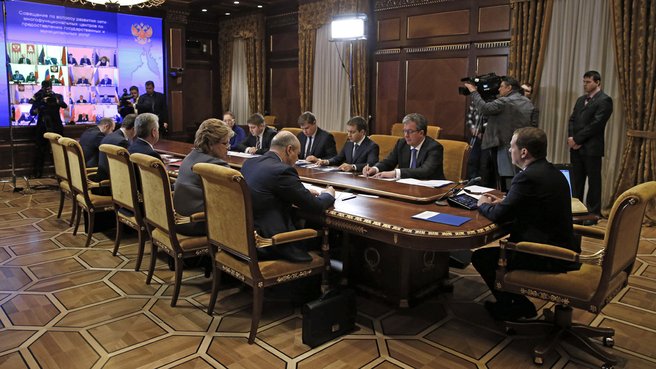"Our objective is to provide 90% of residents with one-stop services by the end of 2015. The number of integrated centres should triple, reaching about 3,000."
Dmitry Medvedev’s introductory remark:
Good afternoon! Today, we have a video conference with the regional authorities on the one-stop integrated government service centres. This is not my first video conference on the subject. We have met and held such conferences here and in other places, but this subject is very important and lengthy, so let’s discuss how things are going, the establishment of IGSCs in the regions, and today’s problems.
Today, Government services are still available in Government facilities through the electronic form or various intermediaries.
Dmitry Medvedev: "Our primary objective is the establishment of integrated centres that are comfortable for the people. Our citizens should not have to turn to different service centres in order to receive different documents."
Our primary objective is the establishment of integrated centres that are comfortable for the people. Our citizens should not have to turn to different service centres in order to receive different documents and get in line at the Federal Migration Service, banks when paying fines and other payments related to traffic police, and in other state and municipal institutions. It takes hours and even days, especially in big cities. And I am not taking into account spent nerves.
I visited several centres established in different regions to see how the project is being implemented. In late November, I toured such a centre in the Kaliningrad Region. About 850 centres operate in Russia, 848 as of December 1, to be exact. One-third of the population have received services there.
Our objective is to provide 90% of residents with one-stop services by the end of 2015. The number of integrated centres should triple, reaching about 3,000. People should not wander around a city or a region looking for such a centre. Centres should be established in close proximity. A single point to receive and issue documents should be established in each area and municipality. These centres should be equipped with high-quality communication channels and modern information systems based on the requirements that have been developed by us. We consider this problem to be a strategic one. Recently, we discussed the issue at the May meeting following presidential executive orders.
Dmitry Medvedev: "Our objective is to provide 90% of residents with one-stop services by the end of 2015. The number of integrated centres should triple, reaching about 3,000."
Last year, the legal basis of integrated centres was developed completely. The Government worked out the list of the most popular state and municipal services that should primarily be provided by such centres. This applies to services related to property registration, issuing passports, construction permits, and more.
Of course, the list should be extended when it is completed, so that a person can receive services in different situations, including acts of civil status, the delivery or adoption of a child, and retirement, as well as the reissuing of documents, etc.
Obviously, the regions play the leading role in developing integrated government service centres. This is why we are holding today’s meeting. Each region has formed a system to manage this complex project and has established commissions. This September, a draft law was introduced into the State Duma and passed in the first reading, according to which constituent entities of Russia will be empowered to organise their integrated centres. The second reading is scheduled for December 10.
However, there are different paces of constructing these centres in each region. Of course, this is connected with financial and geographical situations, and so forth. Moscow, the Rostov Region, and the Krasnodar Territory top the ranking. But I was really surprised this morning when looking through the documents for the meeting that integrated centres have not been established in three regions. Look, it is simply a disgrace! Does this mean presidential executive orders and governmental decisions are ignored, or what? I am referring to the Arkhangelsk and Pskov regions and the Karachai-Cherkess Republic. I would like our colleagues to comment on this situation.
As for the expenditures of regional and municipal budgets related to completing the formation of integrated centres, I gave instructions to allocate 6 billion for 2014-2015 to co-finance the expenditures of the regions. Three billion will be allocated for 2014 and the same amount will be allocated for 2015. Am I right, Mr Siluanov (Anton Siluanov)? The rules for distributing these funds have been developed and submitted to the Government. Naturally, we will discuss and approve them.
There is one more request that is repeatedly addressed by regional governors to the Government. They propose to compensate the funds spent by the regions on state services provided by federal bodies, such as the Federal Service for State Registration, Cadastre and Cartography, the Federal Migration Service, and other organisations. I know that our colleagues are developing these mechanisms and there is a proposal to distribute the state fee for services between the federal and regional budgets. For this, amendments should be introduced into the legislation. Let's discuss this approach, its advantages, and maybe some disadvantages.
This is all I wanted to start with.
<…>











